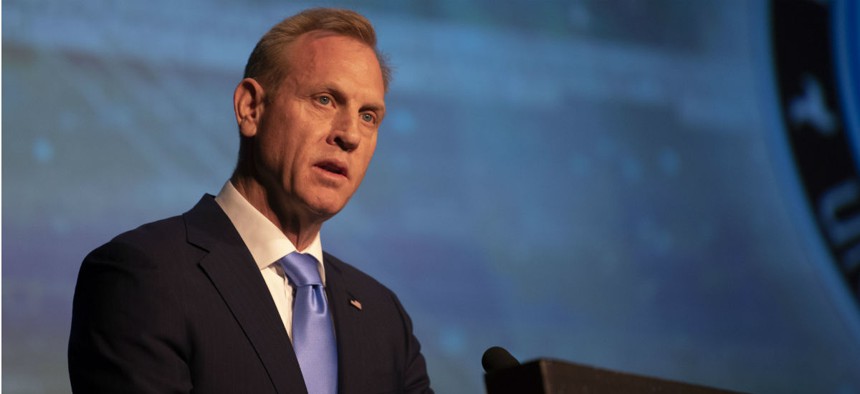Acting Pentagon Chief Moves Quickly to Combat Sexual Assault
Latest report shows a rise in incidents, particularly among young recruits.
Despite the Pentagon’s multi-pronged education and enforcement effort, the number of sexual assaults among service members rose in 2018, from about 14,900 in 2016 to 20,500 last year, according to a report released on Thursday.
Some 7,500 of last year’s complaints came from men, and the greatest increase was in sexual assaults directed against service women ages 17 to 24. Alcohol was a factor in a sexual assault event for 62% of victimized women and 49% of victimized men, the report said, and more than 85% of the victims knew their attacker.
“It is a call to action for us,” said Elizabeth Van Winkle, the executive director of Defense's Office of Force Resiliency tapped to lead the department’s efforts in the area, in a staff interview.
“The most dramatic progress we’ve seen is among those service members who come forward to report,” Van Winkle said. “DoD understands this and has put in place policies and procedures to give victims the control to decide what to do. Restricted reporting allows victims to receive help they need to deal with attacks. Unrestricted reporting brings in military justice officials. This is the heart of the department’s victims-centered approach to reporting.”
Acting Pentagon Chief Patrick Shanahan, who recently made a priority of improving the military justice system’s handling of sexual assaults on bases and at the academies, also weighed in on Wednesday with a new directive to the service leaders. “To put it bluntly, we are not performing to the standards and expectations we have for ourselves or for each other,” he said. “This is unacceptable. We cannot shrink from facing the challenge head on. We must, and will, do better.”
Shanahan said he had accepted recommendations in an April 30 report from a special task force set up to freshen the department’s ongoing initiative to curb and more fairly adjudicate cases of sexual assault and harassment.
He directed implementation, by the end of this year, of six recommendations by the task force. They were:
- Taking steps to seek a stand-alone military crime of sexual harassment;
- Developing new sexual assault climate assessment tools;
- Launching what is called the Catch a Serial Offender (CATCH) Program to improve the identification of repeat offenders;
- Enhancing efforts to “select recruits of the highest character;”
- Preparing new leaders and first-line supervisors for applied leadership challenges; and,
- Executing a prevention “plan of action” that includes “specific objectives towards rigorous research and evaluation of the effectiveness of targeted prevention strategies.”
Shanahan stressed the importance of action by junior officers. “Junior leaders are on the frontline of our fight to eradicate these problems in our ranks and must serve as role models in this effort,” he wrote. “As such, they must be appropriately prepared and held appropriately accountable for promoting civility and cohesion among their subordinates, setting the example through their own behavior.”
In Congress, longtime advocates on the sexual assault issue raised alarms about the increase. “The results of this year's survey on sexual assault in the military are deeply disturbing,” said Rep. Jackie Speier, D-Calif., chairwoman of the Armed Services Subcommittee on Military Personnel. “Despite the hundreds of millions of dollars the Defense Department has spent on sexual assault prevention programs over the last decade, more sexual assaults occurred in fiscal year 2018 than fiscal year 2010…. The department must accept that current programs are simply not working. Congress must lead the way in forcing the department to take more aggressive approaches to fighting this scourge.”
Sen. Kirsten Gillibrand, D-N.Y., who has long championed legislation to remove adjudication of sexual assault complaints from the military chain of command, said, “Almost six years after the Chairman of the Joint Chiefs said the Pentagon was on the clock to solve this problem, sexual assaults continue to increase dramatically while the number of cases going to trial goes down…. The evidence is clear–we need to pass the Military Justice Improvement Act so that trained military prosecutors can handle these cases moving forward and give survivors confidence in the system.”
Shanahan’s directive said, “We will not rest until all service members can serve in an environment of dignity and respect.”




